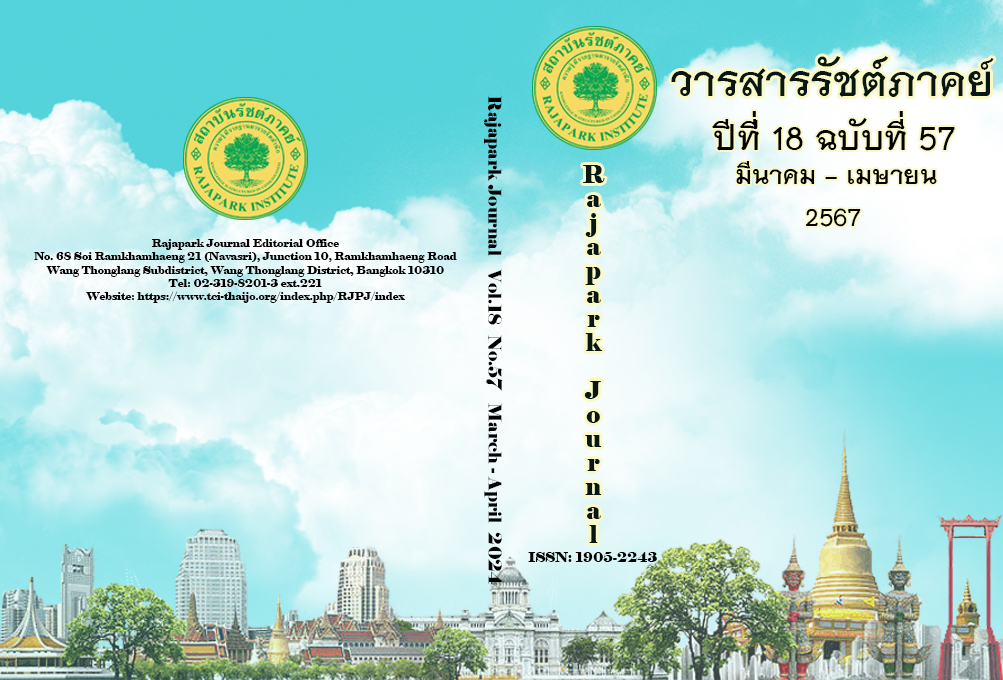Factors Affecting Sleep Behavior Modifications of District Physicians in Bangkok
Main Article Content
Abstract
The purpose of this research was to 1) study the factors affecting the change in sleep behavior among physicians in Bangkok. 2) Study the change in sleep behavior of physicians in Bangkok; and 3) study the relationship between environmental factors, lifestyle factors, mental health factors, and changing sleep behavior among physicians in Bangkok. The sample group was physicians working in public and private hospitals in Bangkok, 400 cases. The research tool was a questionnaire. Statistics used in data analysis were frequency, percentage, mean, and Pearson's correlation coefficient. The results showed that 1) environmental, lifestyle, and mental health factors were high overall. 2) According to the change in sleep behavior, most doctors have not used sleeping pills (whether ordered by doctors or bought their own) in the past month to aid their sleep. Around 82.50% of them took about 30 minutes to fall asleep after going to bed. About 66.80% of doctors felt that their sleep was somewhat problematic in the past month. Moreover, 66.80% of doctors reported feeling sleepy while driving, eating, or attending parties 1-3 times a week in the past month. Additionally, 66.00% of doctors reported feeling the same in the past month. 3) For the result of the relationship between environmental factors, lifestyle factors, mental health factors, and changes in the sleeping behavior of doctors in Bangkok, it was found that gender, age, length of service, lifestyle factors (X2), and mental health factors (X3) were related to the sleeping behavior of doctors in Bangkok with statistical significance at the 0.01 level.
Article Details

This work is licensed under a Creative Commons Attribution-NonCommercial-NoDerivatives 4.0 International License.
Views and opinions appearing in the Journal it is the responsibility of the author of the article, and does not constitute the view and responsibility of the editorial team.
References
Carskadon, M.A. (1990). Patterns of Sleep and Sleepiness in Adolescents. Pediatrician, 17(1), 5-12.
Chinvararak, C. et al. (2021). Sleep Quality and Associated Factors in Preclinical Medical Students in Faculty of Medicine Vajira Hospital. Vajira Medical Journal: Journal of Urban Medicine, 65(4), 332-342.
Choojit, K. (2017). The Effect of Sleep Behavioral Modification Program on Insomnia in Heart Failure Patients[Master’s thesis, Chulalongkorn University].
Khunkittikajohnkul, W., Rakchob, S., & Theerawaad, K. (2018). Sleep Quality of Pharmacy Students at Burapha University 2018. Faculty of Pharmacy, Burapha University.
Krueprayong, A. (2017). Sleep Quality and Fatigue among Flight Attendants of Thai Airways International Public Company Limited (THAI)[Master’s thesis, Dhurakij Pundit University].
Mata, C. (2017). An Association between Sleep Quality and School Performance among Lampang Rajabhat University Students. Faculty of Science Research Journal Lampang Rajabhat University, 2(2), 23-35.
Medical Council Database. (2023). List of Medical Statistics Data. https://www.tmc.or.th/statistics.php
Polruengthong, D. (2018). Effects of Qigong on the Sleep Quality, Physical Fitness, and Mental Health in Elderly[Master’s thesis, Kasetsart University].
Potaros, D. (2017). Factors Related to Sleeping Quality of Nursing Students. The Journal of Faculty of Nursing Burapha University, 25(1), 25-36.
Sangsamee, O. (2018). Sleep Quality of Employees of CPF Food and Beverage Company Limited Nong Chok Branch. Faculty of Business Administration, Ramkhamhaeng University.
Shim, J., & Wan Kang, S. (2017). Behavioral Factors Related to Sleep Quality and Duration in Adults. J Lifestyle Med, 7(1), 18-26.
Siljaru, T. (2020). Research and analysis of statistical data using SPSS and AMOS (18th ed.). Business R&D General Puppet Store.
Srikaew, J., Chaveepojnkamjorn, W., Satitvipawee, P., & Pitikultang, S. (2021). Prevalence of Sleep Quality and Related Factors in Senior High School Students, Ratchaburi Province, Thailand. In The 7th STOU National Research Conference.
Srisa-ard, B. (2013). Statistical Methods for Research, Volume 1 (5th ed.). Suwiriyasan.
Theesudapan, W., & Sripromma, P. (2022). Effects of Insomnia Management Program on Insomnia Severity and Sleep Quality of Nursing Student. Kuakarun Journal of Nursing, 29(2), 277-291.
Wanga, F., & Bírob, E. (2021). Determinants of Sleep Quality in College Students: A Literature Review. Explore, 17(2021), 170-177.
Weerachakul, W., Sang Wang Wang, R., Urairekkul, S., Attawathon, M., & Weerachakul, S. (2020). Sleep Quality and Related Factors in 1st-6th year Dental Students, Faculty of Dentistry Khon Kaen University. North-Eastern Thai Journal of Neuroscience, 8(1), 56-66.
Xiao, H., Zhang, Y., Kong, D., Li, S., & Yang, N. (2020). The Effects of Social Support on Sleep Quality of Medical Staff Treating Patients with Coronavirus Disease 2019 (COVID-19) in January and February 2020 in China. Med Sci Monit, e923549. DOI: 10.12659/MSM.923549.


